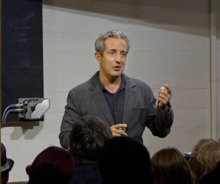| This biography of a living person needs additional citations for verification. Please help by adding reliable sources. Contentious material about living persons that is unsourced or poorly sourced must be removed immediately from the article and its talk page, especially if potentially libelous. Find sources: "Edward Slingerland" – news · newspapers · books · scholar · JSTOR (May 2021) (Learn how and when to remove this message) |
| This article uses bare URLs, which are uninformative and vulnerable to link rot. Please consider converting them to full citations to ensure the article remains verifiable and maintains a consistent citation style. Several templates and tools are available to assist in formatting, such as reFill (documentation) and Citation bot (documentation). (August 2022) (Learn how and when to remove this message) |
| Edward Slingerland | |
|---|---|
 | |
| Born | (1968-05-25) May 25, 1968 (age 56) Maplewood, New Jersey, United States |
| Academic background | |
| Alma mater | Stanford University |
| Doctoral advisor | Philip J. Ivanhoe |
| Academic work | |
| Discipline | Philosophy, Asian Studies, Psychology |
| Institutions | University of British Columbia |
| Website | https://www.edwardslingerland.com/ |
Edward Slingerland (born May 25, 1968) is a Canadian-American sinologist and philosopher. He is Distinguished University Scholar and Professor of Philosophy at the University of British Columbia, where he also holds appointments in the Departments of Psychology and Asian Studies. His research interests include early Chinese thought, comparative religion and cognitive science of religion, big data approaches to cultural analysis, cognitive linguistics, digital humanities, and humanities-science integration.
Early life and education
As an undergraduate, Slingerland attended Stanford University, where he earned a Bachelor of Arts in Asian Languages (with distinction) in 1991. After earning a Masters of Arts in East Asian Languages (Classical Chinese) at the University of California, Berkeley, he returned to Stanford, where he completed his doctorate in Religious Studies under the supervision of Philip J. Ivanhoe.
Career
From 1998 to 1999, Slingerland taught in the Religious Studies department of University of Colorado, Boulder.
From 1999 to 2005, he held a post at the University of Southern California with a joint appointment in the School of Religion and Department of East Asian Languages and Cultures.
Since 2005, he has been a professor at the University of British Columbia, originally in the Asian Studies department until 2021, when he joined the Philosophy department.
Slingerland is the Director of the Database of Religious History (DRH), an online, quantitative and qualitative encyclopedia of religious cultural history. In 2021, the project received a $4.8 million grant from the John Templeton Foundation.
Bibliography
Slingerland is the author of six academic books as well as two books written for a popular audience. He has also authored and co-authored numerous academic articles, which have appeared in publications such as Nature, Ethics, the Annual Review of Psychology, and the Journal of the American Academy of Religion.
His 2003 book Effortless Action: Wu-wei as Conceptual Metaphor and Spiritual Ideal in Early China was awarded "Best First Book in the History of Religions" by the American Academy of Religion.
Academic books
- Slingerland, E. (2018). Mind and Body in Early China: Beyond Orientalism and the Myth of Holism. Oxford: Oxford University Press.
- Slingerland, E. (2011). Creating Consilience: Integrating the Sciences and the Humanities. Oxford: Oxford University Press.
- Slingerland, E. (2008). What Science Offers the Humanities: Integrating Body and Culture. Cambridge: Cambridge University Press.
- Slingerland, E. (2006). The Essential Analects: Selected Passages with Traditional Commentary. Indianapolis: Hackett Publishing Company.
- Slingerland, E. (2003). Effortless Action: Wu-wei as Conceptual Metaphor and Spiritual Ideal in Early China. Oxford: Oxford University Press.
- Slingerland, E. (2003). Analects: With Selections from Traditional Commentaries. Indianapolis: Hackett Publishing Company.
Popular books
- Slingerland, E. (2021). Drunk: How We Sipped, Danced, And Stumbled Our Way To Civilization. Boston: Little, Brown And Company.
- Slingerland, E. (2014). Trying Not to Try: Ancient China, Modern Science, and the Power of Spontaneity. New York: Crown Publishing Group.
References
- https://stage.edge.org/memberbio/edward_slingerland
- "Database of Religious History (DRH)".
- "University of British Columbia, 'Database of Religious History awarded largest grant for a UBC humanities research project'".
- "American Academy of Religion".
- Hardcover 2018, ISBN 978-0190842307
- Hardcover 2011, ISBN 978-0199794393
- Hardcover 2008, ISBN 978-0521877701
- Hardcover 2006, ISBN 978-0872207738
- Hardcover 2003, ISBN 978-0195138993
- Hardcover 2003, ISBN 978-0872206366
- Hardcover 2021, ISBN 978-0316453387
- Hardcover 2014, ISBN 978-0770437619